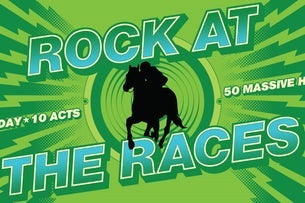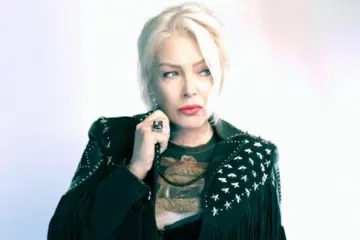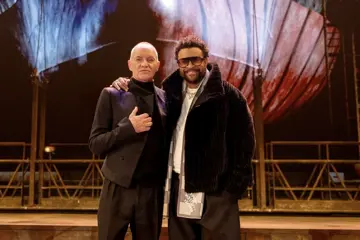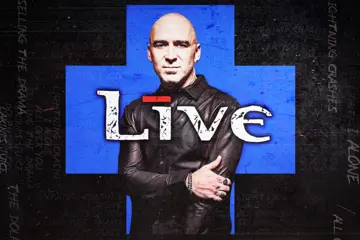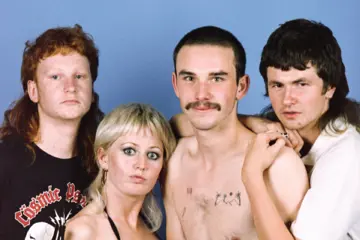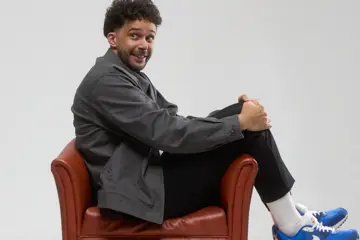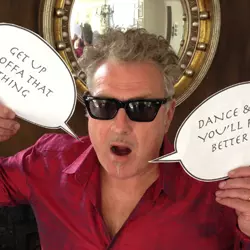 Ross Wilson
Ross WilsonThe cover of Juke in July 1981 posed a simple question:
“Was there ever an Australian rock scene without Ross Wilson?”
Sixty years ago this month, Ross Wilson’s high school band, The Pink Finks, released their debut single, a remarkable cover of Louie Louie.
In the six decades since, Ross has fronted not one but two chart-topping bands, written the ultimate Aussie party anthem Eagle Rock, blazed a trail for Aussie bands in the US, discovered Skyhooks, helped save Mushroom Records from going broke, and become the first white Aussie rock star to write about Indigenous issues.
And that’s just part of the story.
As Ian McFarlane states in his indispensable Encyclopedia of Australian Rock and Pop: “The tenacious Ross ‘The Boss’ Wilson has given more to the institution of Australian rock and pop than can ever possibly be repaid.”
In his 2006 review of the Countdown Spectacular tour, The Go-Betweens’ Robert Forster pondered: “Is Ross Wilson a genius? He’s the one performer tonight whom you look at and think, he could have done something overseas if he’d wanted to.
“Everything about him is unique. The ways he moves, dresses, sings – and his songs.”
To mark Ross Wilson’s 60 years in the Australian music industry – six decades of cool – here are 60 things you might not know about Ross the Boss.
Oh, baby
Don't miss a beat with our FREE daily newsletter
The Pink Finks’ first single was a raucous cover of Richard Berry’s Louie Louie, which hit number 16 on the Melbourne charts. Because of the supposed obscene lyrics, the song was famously investigated by the FBI, who concluded that it was “unintelligible at any speed”. Ross Wilson had no idea what the lyrics were, so he just made up his own.
RAW power
Ross Andrew Wilson was born in Melbourne on November 18, 1947. His school friends called him Willy, while Daddy Cool drummer Gary Young and legendary roadie Graham “$crooge” Madigan call him “Budge”, which Ross believes is short for budgerigar, a reference to his pointed nose.
His initials formed the name of Ross’s early ’90s funk outfit, RAW, who recorded several songs – including a track called Mind Fuck – but nothing was officially released at the time. RAW featured guitarist Michael Sheridan from Max Q, and Horsehead and Uncanny X-Men drummer Max Waugh.
A Wild One
Ross’s first rock ’n’ roll experience was February 4, 1958, when the 10-year-old went to Festival Hall to see Johnny O’Keefe and the Dee Jays open for Buddy Holly & The Crickets, Jerry Lee Lewis and Paul Anka. “He [JO’K] was dynamite live,” Ross recalls. “He did his best to blow his idols off stage. What a role model! After that show, I used to have fantasies about being on stage.” Ross released a power-funkin’ cover of JO’K’s Wild One/Real Wild Child – another RAW recording – in 2016.
Shake it up
Forty-eight years after seeing Jerry Lee Lewis, Daddy Cool covered Whole Lotta Shakin’ Goin’ On for their third studio album, The New Cool. “It was one of the first rock ’n’ roll songs I ever heard in my life. My friend, who I used to play with after school, his mum had a copy, and it’s one of the greatest rock songs ever.”
The two Rosses
Ross was still at Haileybury College when he formed his first band in 1964, featuring a chubby 13-year-old named Ross Hannaford on guitar. Fun fact: They were initially called The Fauves. Their manager then planned to call them “Pink Thinks”, but they were advertised as “The Pink Finks,” and the name stuck.
Their first gig was at the Anglican Church Hall in Marriage Road, East Brighton.
On drums was Richard Franklin, who later became a major movie director, making Patrick, Roadgames and Psycho II.
After Louie Louie, The Pink Finks released three more singles: covers of Joe South’s Untie Me, Willie Dixon’s Backdoor Man and Johnny Chester’s You’re Good For Me. As rock historian Ian McFarlane noted, “Was it any wonder the records failed to chart? On the sinister Backdoor Man, Wilson sounded like a slimy, depraved 60-year-old guy with nefarious intentions. Not bad for a 17-year-old kid!”
You gotta fight for your right …
After The Pink Finks, Ross formed The Party Machine, a band that later featured Spectrum’s Mike Rudd.
The Party Machine’s songbook was seized by the Victorian vice squad, who deemed it “obscene and seditious”. It featured Ross’s song I Don’t Believe All Your Kids Should Be Virgins.
A happy accident
When he was 16, Ross was hit by a car, injuring his leg. This kept him out of the Vietnam draft. “I’m forever grateful for that.”
Now listen!
Ross went to the UK in 1969 to sing with Procession. He started writing Eagle Rock in Surrey after he saw a photo in The Sunday Times, showing people dancing at a juke joint in America. The caption said: “Some Negroes doing the Eagle Rock and Cutting the Pigeon Wing”.
Ross debuted Eagle Rock with his experimental outfit Sons Of The Vegetal Mother at Brunswick Street’s T.F. Much Ballroom (which stood for “Too Fucking Much”).
Brown rice is better than white rice
In the UK, Ross got heavily into healthy eating and macrobiotic food, which inspired the Zappa-esque Sons Of The Vegetal Mother, who had a song called Brown Rice. The band’s only release was the Garden Party EP.
We’re stepping out
Eagle Rock was 1971’s biggest-selling Australian single, spending 10 weeks at number one, which was a local record until Tones and I’s Dance Monkey.
The Eagle Rock film clip – which cost $300 to make – was directed by Chris Löfvén, who had been the bass player in ’60s band Cam-Pact.
Fun fact: Many people believe the live scenes were shot at Sunbury. But that festival was yet to happen. The live footage was filmed at the Myponga Pop Festival in South Australia, including a shot of Ross’s then-pregnant wife, Pat, clapping along in the front row.
Aussie Burgers, which pops up at the end of the clip, is now the McDonald’s opposite Luna Park in St Kilda. The clip’s main location was the Blue Dolphin café in Clarendon Street, South Melbourne, which became a shoe shop.
Daddy who?
Cashing in on Daddy Cool’s success, an Adelaide band named Drummond – featuring Graeham Goble, who would later form LRB – did a Chipmunk-like version of the Daddy Cool song (originally recorded by US doo-wop group The Rays in 1957). It topped the Australian charts in 1971.
Daddy who? Daddy nude!
Ross appeared naked in Chris Löfvén’s short film Part Two – The Beginning.
Eagles and crocodiles
Eagle Rock inspired Elton John’s Crocodile Rock, which topped the US charts. Elton heard the song when he toured Australia for the first time in 1971. He said, “Daddy Cool are one of the most impressive bands I’ve ever heard, and Eagle Rock is one of my favourite tracks of all time.”
Elton’s lyricist, Bernie Taupin, can be seen wearing a “Daddy Who?” badge on the cover of Elton’s 1973 album Don’t Shoot Me I’m Only The Piano Player.
And Elton produced Long John Baldry’s cover of Daddy Cool’s Come Back Again, which was the opening track on Long John’s 1972 album, Everything Stops For Tea.
Kiwi rock
In 1990, Eagle Rock hit number one in New Zealand. It knocked off Madonna’s Vogue to spend four weeks on top to become the longest-running Aussie number one in New Zealand in the ’90s.
Swan dive
Marc Bolan also dug Eagle Rock, demanding to meet Ross Wilson when T. Rex toured Australia in 1973. When the glam rock god met the Aussie star, he said, “Oh, so it was you that ripped off Ride A White Swan!” But they shook hands, and Bolan declared Ross “a superstar”.
Petty, Petty, good
Daddy Cool also inspired Tom Petty and the Heartbreakers. Keyboards player Benmont Tench bonded with Tom Petty and Mike Campbell when “all three of us discovered that we loved this record by this band named Daddy Cool, an Australian band that was just fantastic”.
Catch this wave
Daddy Cool were the first Australian band that Tim Finn saw. “They showed us what Australian rock ’n’ roll was all about,” the Split Enz legend said when he inducted DC into the ARIA Hall of Fame. “Soulful and funky, with a lead singer who moved like he was riding a wave. It was a friendly wave, everyone was welcome.”
Daddy Cool cured me!
Daddy Cool’s publicist in the US was the infamous impresario Kim Fowley, who created the Runaways.
Fowley was in a wheelchair when he greeted Daddy Cool at the LA airport. He rolled through the crowd, yelling, “I’ve got to speak to Daddy Cool!” When he spotted the band, he leapt from the chair, screaming, “I can walk! Daddy Cool cured me!”
When Fowley died in 2015, Ross called him “a friend [who] gave me good advice when I swam with sharks in the USA”.
Please Please America
Daddy Cool were trailblazers for Australian bands. At a time when most Aussies headed to the UK, DC went to the US. With Eagle Rock still at number one, DC landed in America in August 1971.
The band enjoyed a rave in Rolling Stone: “All factors considered, the basic criterion for judging Daddy Cool’s debut album is whether or not it’s fun: it sure is.”
And the Rolling Stone review of their second album, Teenage Heaven, called Please Please America “Daddy Cool’s near-masterpiece”.
“We loved America,” Ross says, even though he suffered from stage fright at the band’s first big US gig, at LA’s Whisky a Go Go. DC got a record deal with Reprise and returned to the US, where they toured with Deep Purple and Fleetwood Mac.
Ross told the Americans: “We might be the first Australian band you’ve seen, but we won’t be the last.”
Kay day
Ross Wilson and Kim Fowley wrote a song together, Down To Earth, which was on Mondo Rock’s debut album, Primal Park, in 1979.
Three years later, it was covered by John Kay and Steppenwolf on their album Wolftracks.
Cheers!
Kevin Bloody Wilson (no relation) did a parody version of Eagle Rock in 2009 called Me Beer’s Cut Off.
King Mondo
The Wiggles covered Eagle Rock in 2003 – with Ross playing the role of “King Mondo”.
Eagle Rock inspired a fine Aussie tradition
Eagle Rock led to “the Eagle Drop”. When the song comes on, people drink beer, dance like eagles and drop their pants. The ritual is particularly popular in Queensland and Canberra. There’s even a Facebook group, “I Drop My Pants When Eagle Rock Is Playing”.
King Kong
After Daddy Cool split, Ross formed Mighty Kong. They released just one album, All I Wanna Do Is Rock, at the end of 1973. You Am I covered the title track for the Berlin Chair single.
Smartarse Songwriters
In July 1973, Mighty Kong were doing a gig at Melbourne Uni’s cafeteria. The support act was a new band called Skyhooks. “I thought they were great,” Ross recalls. “It was everything I liked – humour and musical power. They weren’t taking themselves seriously – they were taking the piss out of the established scene.” Ross became Skyhooks’ mentor and producer.
Just as Harry Vanda and George Young were able to advise AC/DC, imparting the lessons they’d learned in The Easybeats, Ross Wilson became the Hooks’ Yoda. “I was very interested in shielding them from all the bad things that had happened to Daddy Cool, so I was passing on as much information as I could.”
Million dollar riff
Ross signed Skyhooks bass player and songwriter Greg Macainsh to his publishing company. Unhappy with his own publishing deal, Ross started Doo Dah Music. “I had this 50-50 deal and I started to think, ‘Why does it have to be 50-50?’ That was the standard deal that everybody pretty much did. Some were worse. I thought, well, I’ll do one that’s different – 70-30. And that induced Greg to come on board.
“It was around that time that things started to change, and I’m glad to say that I had a part in it.”
I need another pill to calm me down
Until Skyhooks came along, the biggest-selling Aussie album was Daddy Cool’s debut. Then the Hooks’ debut, Living In The 70’s, sold four times as much. It was Mushroom Records’ first number one – spending 16 weeks on top – saving the label from bankruptcy.
Ross Wilson also produced the band’s next two albums, Ego Is Not A Dirty Word and Straight In A Gay Gay World. “I have no hesitation in saying that I was the sixth Skyhook, just like George Martin was the fifth Beatle. I was in there all the way.”
We’re not in Kansas anymore
Chris Löfvén, who made the Eagle Rock clip, later directed the movie Oz, which featured Ross’s first solo single, Living In The Land Of Oz. It was a groundbreaking record – Ross was one of the first Aussie artists to address Indigenous issues. And he didn’t hold back, singing: “150 years ago, the black man lived in peace and the land was still/ Now a city of millions covers the soil and the blacks have all been killed … and nobody seems ashamed.”
The Wizard of Oz
In the mid-’70s, Ross also started a record label called Oz, with Glenn Wheatley. They released records by Jo Jo Zep and The Falcons, Stylus, Stiletto, Red Symons, Leon Berger, Darryl Cotton and The Party Boys.
Driving the Falcons
Ross produced Jo Jo Zep and The Falcons’ first two albums, Don’t Waste It and Whip It Out.
Discovering The Johnnys
Ross also produced The Johnnys’ two albums – 1986’s Highlights Of A Dangerous Life and 1988’s Grown Up Wrong. He convinced Michael Gudinski to sign the band. “The Johnnys were really shambolic, but there was something there,” Ross told Patrick Emery, the author of the Spencer P. Jones biography Execution Days. “They were interesting and they had funny lyrics. And The Johnnys had their genre – cowpunk.”
Flying with the Jets
Ross produced an album for The Screaming Jets, 2000’s Scam, saying they got him enthused about producing again.
He produced a Jets gem called ESFD, which became a B-side.
Mondomania
It was F. Scott Fitzgerald who observed, “There are no second acts in American lives.” But in Australia, a decade after hitting number one with Daddy Cool, Ross Wilson was back on top of the charts with Mondo Rock. The band’s second album, Chemistry, hit number two and won Best Album at the Countdown Awards.
Mondo Rock aimed to make “adult” music that wasn’t soft or easy-listening. “That was my original intention, I think,” Ross said. “That Mondo Rock should be a band to play music for big kids.”
I asked Ross if fame was different the second time ’round.
“It was different, because I had been through it before,” he replied, “I was better equipped, more media-savvy and self-aware. But it still takes its toll. The glare of the media spotlight and the endless touring can still drive you mad. It took longer, but it still drove me nuts after a while.”
For those about to Bop
Mondo Rock’s James Black believes that guitarist Eric McCusker writes songs about making love, while Ross writes songs about fucking.
Who’s that Bop Girl?
Before BMX Bandits, Nicole Kidman’s big break was appearing in the film clip for Bop Girl, the song Ross wrote for his then-wife, Pat, and their 12-year-old son, Daniel. “I wanted to write something that he might like.”
The video, directed by Gillian Armstrong, featured a 16-year-old unknown Nicole Kidman. The song hit number two on the Australian charts in 1983, kept out of top spot by Austen Tayshus’s Australiana.
Bop Girl also generated some heat in America. In Rolling Stone, Kurt Loder called it “a five-star summer dance tune”.
Do that modern bop
“Ross always latched onto key words, like ‘daddy’ and ‘cool’ and ‘bop’,” Eric McCusker points out. “He keeps coming back to them, they’ve become like motifs, keystone lyric ideas that he can hang all this other stuff on.”
Ross followed Bop Girl with Mondo Rock’s The Modern Bop.
“The idea of The Modern Bop was appealing to me, because bopping became a rock ’n’ roll thing as well. It’s all about sex.”
Flamingos walk and sway in peace
You know John Farnham’s A Touch Of Paradise? Of course you do, it was a big part of his blockbuster Whispering Jack. But it actually started out as a Mondo Rock song.
Four years before Whispering Jack, A Touch Of Paradise was on Mondo Rock’s Nuovo Mondo album. It was actually the first song Ross came up with for Mondo Rock. He wrote it in 1976 with Kevin Gulliver Smith, who had been the lead singer of Company Caine.
Ross has been posting previously unavailable songs on streaming platforms – his solo version of A Touch Of Paradise will go online on June 20.
Paradiso
There was even an Italian version of A Touch Of Paradise – Fiordaliso’s Vicino al Cielo.
Ross wrote another gem that Farnham recorded
On the same night that he wrote the Mondo Rock classic Cool World, Ross also came up with We’re No Angels, which became the final track on the band’s Chemistry album. It later turned up on John Farnham’s Age of Reason.
He even wrote and produced a song for Norman Gunston
In the early days of Mondo Rock, Ross wrote some songs with music journalist David Pepperell. “He had this idea for a punk musical. Out of that came I Might Be A Punk (But I Love You Baby), which Norman Gunston recorded. It’s a pretty funny record.”
Please Please America (Part 2)
An Atlantic Records executive, in Sydney for a conference, heard Mondo Rock’s State Of The Heart on the radio, tracked down the band and offered them a three-year, six-album deal, promising a $1 million advance. Atlantic released an edited version of State Of The Heart in America, cutting the bass solo and the ah-oohs. “They cut what made the song work, an essential element of the drama. It was more than four minutes long, and they hated that in America at the time.”
Five years later, Rick Springfield’s cover of the song was a Top 40 smash in the US. His version was four minutes long.
I know your name…
Earlier this year, when he was listing his five favourite Australian bands, Rick Springfield placed Daddy Cool at number three and said, “Incredible band. If you haven’t heard Ross Wilson sing, he’s got that Stones kind of thing.”
Rick covered State Of The Heart in 1985, playing it at Live Aid and taking it to number 22 on the US charts, with a video directed by David Fincher.
Crazy for you
There was also a Mexican version of State Of The Heart – Loco Por Ti by Matrícula 2 in 1993.
Classic Queen
The second single from 1982’s Nuovo Mondo was The Queen And Me, which featured a sax solo by British musician Raphael Ravenscroft, who played the sax riff in Gerry Rafferty’s Baker Street. The video featured actress Megan Williams, star of The Sullivans and partner of Ian Moss, who sadly died of cancer in 2000, aged 43.
Please Please America (Part Three)
Mondo Rock toured Australia with Elton John in 1984. The English superstar told the band, “We’re going to take you to America.” But Mondo Rock never made it to the US with Elton. In fact, shows in New Zealand were their only gigs outside of Australia.
It was a party night
The legendary American recording executive Clive Davis heard Mondo Rock’s Come Said The Boy and said simply: “That’s a pop classic.”
It was the band’s biggest hit, rising to number two – kept out of top spot by Pat Benatar’s Love Is A Battlefield. Ross believes it would have gone all the way if it hadn’t been banned by Sydney’s 2SM, which was then owned by the Catholic Church.
Come Said The Boy was eventually released in the US by the Columbia label, who decided to edit the song. “They cut the guitar solo in half,” laments the song’s writer, Eric McCusker. “I haven’t been able to listen to it since then.”
The quote from Ross at the time was: “Hey man, when are they gonna let me have a hit with my hit?”
He was on MTV in the ’80s
Come Said The Boy saw Mondo Rock land on MTV in the US, an experience Ross wrote about on his 2003 album, Country & Wilson.
Ooh, that’s just the start of it…
Mondo Rock did get their American hit in 1987. Columbia dug Primitive Love Rites, and it started rocketing up the charts, with independent promotions people plugging the record at radio. And then … the American current affairs show 20/20 exposed the “payola” scandal.
“Our record was going up the charts, and we were like, ‘This is happening, start packing your bags, guys!’ Then this thing happened and, overnight, everything on Columbia, including the big guys like Bruce Springsteen, went off the charts. Three months later, it was business as usual, but not for us, that was it.”
Primitive Love Rites reached number 71 in the US, hitting number one in Salt Lake City.
Stop the fight
Mondo Rock released their final studio album, Why Fight It, at the end of 1990. It was a big-budget affair, produced by Waddy Wachtel, and featuring Parliament-Funkadelic’s Bernie Worrell and former Beach Boy Ricky Fataar. But the album was not a success, failing to crack the Australian Top 100.
After six studio albums, five record companies, four Top 10 albums, nine Top 40 singles – including three Top 10 hits – and more than 30 members, the show was over for Mondo Rock, though they would re-form for several successful tours.
It’s the oldest of tales
Before the end of Mondo Rock, Ross issued his first solo album, 1989’s Dark Side Of The Man. It featured his biggest solo hit, Bed Of Nails.
Joint effort
Daddy Cool planned to do a joint tour and album with Skyhooks in 1994. But the plans were shelved when the first single, Skyhooks’ Happy Hippy Hut and DC’s Ballad Of Oz, stalled at number 35.
Come Back Again
Daddy Cool ended up re-forming for the Tsunami Benefit Concert at the Myer Music Bowl in 2005. It was their first live appearance in 30 years.
Eternally cool
Daddy Cool released just two studio albums – 1971’s Daddy Who? Daddy Cool! and 1972’s Sex, Dope, Rock ’n’ Roll: Teenage Heaven (re-titled simply Teenage Heaven in the US) – until their comeback album, 2006’s The New Cool, which included the seven tracks intended for the joint album with Skyhooks.
Stepdaddy Cool
Ross is kind of the step-stepdad of Neighbours chart-topper Holly Valance. Ross’s wife, Tania, was married to Holly’s dad.
In 2018, Ross played himself in Neighbours, where he was greeted by his real-life stepdaughter Olympia Valance, who played Paige. She said, “I am so sorry, I actually didn’t know who you were, so I don’t know any of your songs. No offence.”
“None taken,” Ross replied. “My own kids don’t even know my songs.”
Peace offering
Joe Cocker’s final single was I Come In Peace – written by Ross Wilson and The Angels’ Rick Brewster.
The song inspired the name of Ross’s latest band – Ross Wilson & The Peaceniks.
Triple Hall of Famer
When Mondo Rock are inevitably inducted into the ARIA Hall of Fame, Ross will be our first triple Hall of Famer. Alongside Dame Nellie Melba, Ross was part of the second induction in 1989, and then Daddy Cool entered the Hall in 2006.
A tribute?
The rooArt label planned a Ross Wilson tribute album at the start of the ’90s. Sadly, it never happened. Skyhooks were going to cover Bop Girl. Greg Macainsh recalls: “It just seemed to be right, especially for Shirl’s voice. And we could see the TV Week headline: ‘Bop Shirl’”
A hell of a time
Jimmy Barnes says of Ross Wilson: “Ross has music as his pulse.” Barnesy’s 1993 album, Flesh and Wood, featured a duet with Ross – Hell Of A Time.
Barnesy voted for Ross in a newspaper poll ranking Australia’s greatest singers, saying: “His voice can purr like a cat or growl like a caged beast. I think the beast inside is only happy when he is making music.”
Stuck on Facebook
Despite starting out six decades ago, Ross Wilson has kept in touch with modern technology, and he’s still making music. His 2023 EP was called She’s Stuck On Facebook All The Time. The title track was a tragicomedy about a guy who’s not getting any action because his partner is spending all her time on social media.
Just Goodbye
Ross Wilson’s final recording with Ross Hannaford was appropriately called Just Goodbye. It was on the album Some Lonesome Picker, a tribute to Country Radio’s Greg Quill.
Ross Wilson turns 78 this year, but he has no plans to retire. He’s working on a new EP and album, and he’s gigging as hard as ever, with 12 shows in June, in Queensland, NSW, Canberra, Victoria and Tasmania.
“The role model in Australia is Slim Dusty,” he says. “You die with your boots on.”


